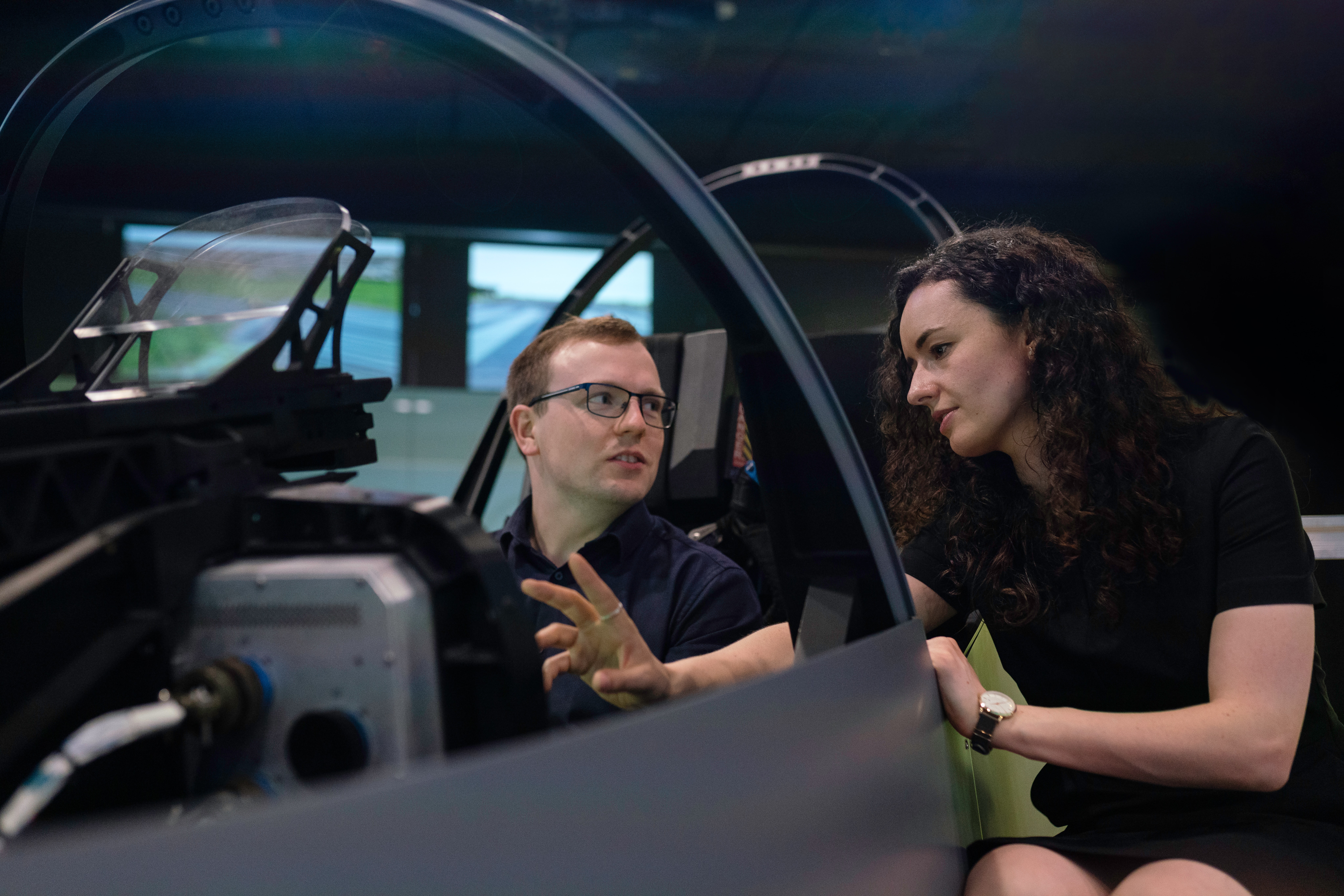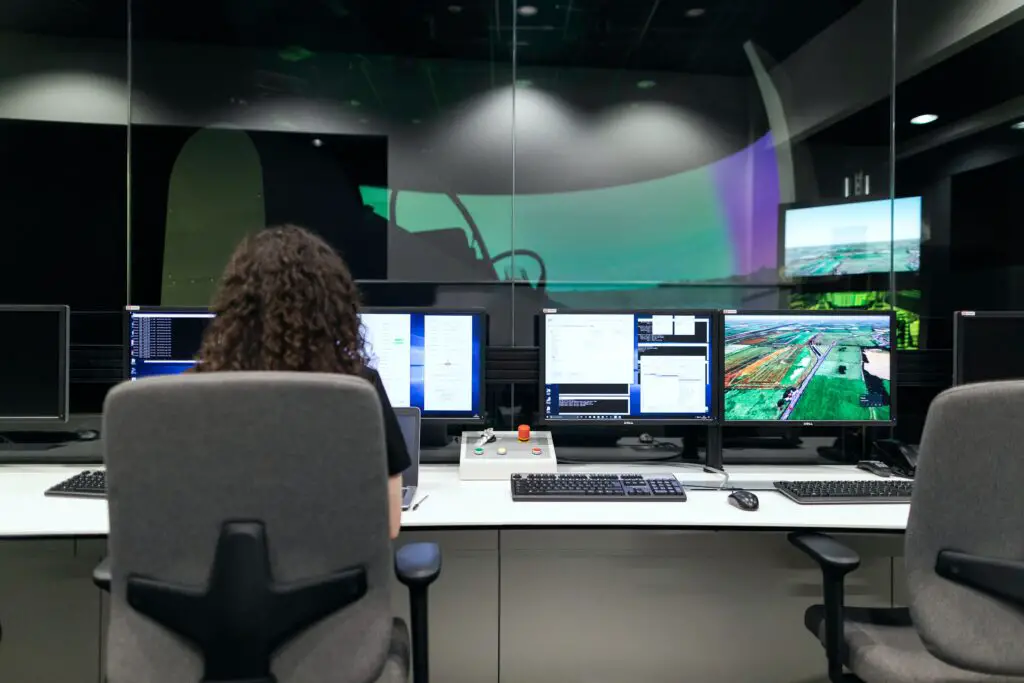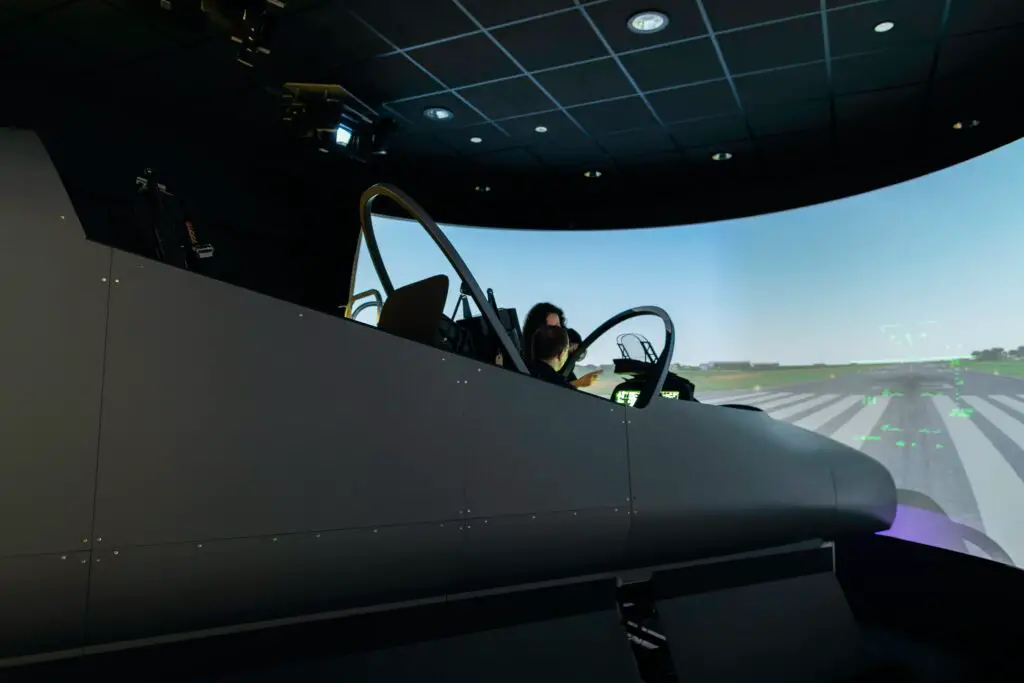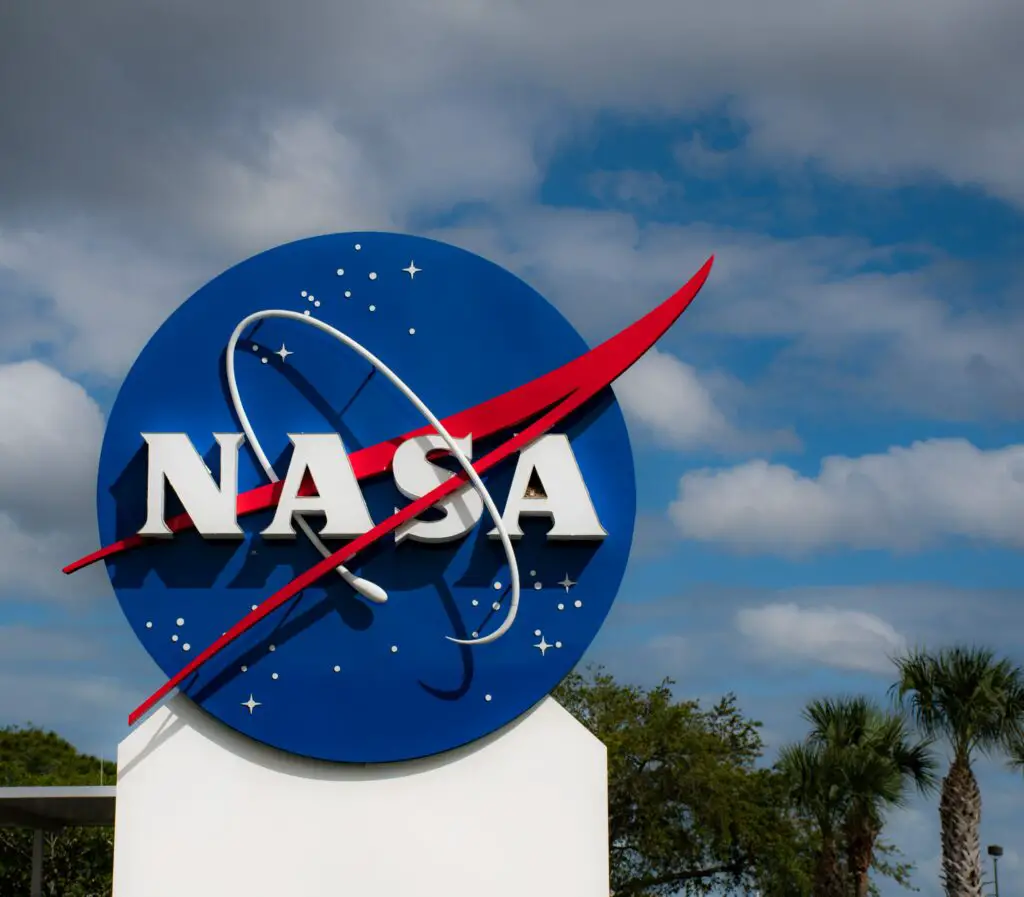Attending the best aeronautical colleges in the US could turn those paper airplanes you made as a kid into a metal machine that soars through the skies at 36,000 feet (or higher). ✈️
Bear in mind that building state-of-the-art aircraft is not an easy feat, so keep an eye out for schools with A+ facilities, instructors, and partnerships.
Raring to assemble a plane or a rocket ship? Start your journey with the 15 best aeronautical schools. 🛣️
- Aeronautics vs. Aviation: What’s the Difference?
- 1. Georgia Institute of Technology
- 2. Virginia Tech
- 3. Purdue University
- 4. Ohio State University
- 5. Massachusetts Institute of Technology
- 6. Arizona State University
- 7. University of Michigan – Ann Arbor
- 8. California Polytechnic State University
- 9. Hallmark University
- 10. University of Texas-Austin
- 11. University of Illinois Urbana-Champaign
- 12. Stanford University
- 13. Embry-Riddle Aeronautical University
- 14. University of Colorado-Boulder
- 15. California Institute of Technology
- The Best Aeronautical Schools in the US: Frequently Asked Questions
Aeronautics vs. Aviation: What’s the Difference?
Aeronautics is the science of building, designing, and developing aircraft and related systems for dedicated purposes, like commercial flight and defense infrastructure. ✈️
On the other hand, aviation refers to operating or flying aerial vehicles as a pilot. 🧑✈️
Professionals who took up aeronautics are called aerospace or aeronautical engineers, which makes sense since aeronautics actually falls under the umbrella of aerospace engineering. 🚀
That’s why you’ll see schools recommending aerospace engineering programs if you’re eyeing to learn aeronautics and can even extend as far as building spacecraft — but that’s a different story. 😄
1. Georgia Institute of Technology
Georgia Tech is consistently ranked as one of the best aeronautical colleges in the United States — and for good reason. 💯
The school allows students to choose from multiple academic options to carve out their career paths. For example, techies might enjoy Avionics Integration or aspiring engineers focused on safety will benefit from taking a course on Accident Causation and System Safety. 🧰
It doesn’t stop there though! You can contribute to any of the eight multidisciplinary research areas that will let you explore high-tech laboratories like the Maker Spaces.
📌 Location: Atlanta, Georgia
💰 Cost of Attendance: $28,536 (in-state), $49,648 (out-of-state)
📈 Acceptance Rate: 21 percent
2. Virginia Tech
If studying aeronautics with a dash of something new (and having access to design competitions) floats your boat, Virginia Tech’s aerospace engineering program might be the thing for you. 🤩
Undergraduates can choose a specialization from nine Technical Tracks, with interesting areas focused on aero/hydrodynamics, naval engineering, and energy and the environment.

That’s not all though! Students can personally witness German aerospace engineering excellence through the school’s exchange program with HAW Hamburg. 😯
📌 Location: Blacksburg, Virginia
💰 Cost of Attendance: $36,786 (in-state, on-campus), $57,996 (out-of-state, on-campus)
📈 Acceptance Rate: 66 percent
3. Purdue University
Following the footsteps of Neil Armstrong, the first man on the moon, can land you at the doorstep of Purdue as an aeronautical engineering student. 🧑🚀
You’re expected to first complete engineering subjects before leaping into lessons like aircraft design and propulsion in your sophomore and junior years.
Tinker around with flying objects and radio frequency systems in different high-tech facilities when you choose your specialization. Chances to upgrade your knowledge are available when you join AAE 49700 A.K.A an independent or group research project.🏆
📌 Location: West Lafayette, Indiana
💰 Cost of Attendance: $24,882 (in-state, on-campus), $43,894 (out-of-state, on-campus)
📈 Acceptance Rate: 67 percent
4. Ohio State University
Expect to be industry-ready after college with Ohio State University’s outstanding aerospace engineering program. 🤩
Apply what you’ve learned and test your creations in Ohio State’s state-of-the-art facilities like machine shops and research laboratories. On top of that, Pratt & Whitney Aircraft and similar companies are involved in the school’s research projects and internships, boosting its students’ industry opportunities. 💯

Acing standardized tests like the SAT or ACT and a good transcript get your foot in the door, but a teacher or counselor recommendation could boost your application to Ohio State.
📌 Location: Columbus, Ohio
💰 Cost of Attendance: $31,008 (in-state, on-campus), $57,164 (out-of-state, on-campus)
📈 Acceptance Rate: 68 percent
5. Massachusetts Institute of Technology
Who knew Massachusetts Institute of Technology (MIT) played a major role in the US military during World War I and II? No wonder MIT ranks as one of the best aeronautical schools in the US.
Today, aerospace engineering students at MIT receive world-class training under experts who have flown Space Shuttle missions or advised Mitsubishi Heavy Industries.
Enjoy working with field professionals via the school’s signature Undergraduate Research Opportunities Program where you can dabble in areas like Autonomous Systems & Decision Making or Vehicle Design & Engineering.
To get into MIT, you need a jaw-dropping personal essay, two impressive recommendation letters from high school teachers, and a February Updates & Notes Form before you can declare a major. ✅
6. Arizona State University
Do things like ‘climate modeling’ and ‘experimental fluid mechanics’ fascinate you? If so, try applying to the aerospace engineering program at Arizona State University (ASU). ☀️

Enjoy courses like Aircraft Systems Design and Space Vehicle Dynamics and Control under the aerospace engineering program. The school also has a Global Education Program which lets you work on research or design projects abroad. 🌎
Entering this program calls for meeting the minimum grade per standardized test (that’s a 1210 SAT score, 24 ACT combined score, or a 3.00 minimum GPA). Graduating within the top 25 percent of your high school class works too. ✅
📌 Location: Tempe, Arizona
💰 Cost of attendance: $34,632 to $35,712 (in-state, on-campus), $51,811 to $53,661 (out-of-state, on-campus)
📈 Acceptance rate: 88 percent
7. University of Michigan – Ann Arbor
A successful aeronautics career includes direct immersion and an active alumni network which the University of Michigan – Ann Arbor’s (U-M) has. ✨
Difficult topics like gas dynamics can be easily grasped when you get your hands dirty at U-M’s well-stocked facilities, such as the aero machine shop, propulsion laboratories, and wind tunnels.
Its aerospace engineering program also has multiple research opportunities to beef up your expertise. The Summer Undergraduate Research in Engineering can put you on high-caliber projects like the Dynamics of Laser-Guided Electrical Discharges in Supersonic Flow. 😄
📌 Location: Ann Arbor, Michigan
💰 Cost of Attendance: $33,555 (in-state, on-campus), $72,153 (out-of-state, on-campus)
📈 Acceptance Rate: 26 percent
8. California Polytechnic State University
If the trailblazing plane Rutan Model 76 Voyager designed by Cal Poly alumnus Burt Rutan was a childhood inspiration, then you’re most probably excited to take up aeronautics as your college major to make another outstanding invention. 💪

Building the next big thing in the sky or improving aerial equipment is possible with 40 elective options to choose from, ranging from aircraft performance to applications of remotely piloted aircraft systems.
Take your lessons one step further when you sketch sustainable vehicles at the Prototype Vehicles Laboratory or learn from the field professionals at the Vandenberg Space Force Base (just an hour’s drive away). 🌌
📌 Location: San Luis Obispo County, California
💰 Cost of Attendance: $33,522 (in-state, on-campus), $53,706 (out-of-state, on-campus)
📈 Acceptance Rate: 38 percent
9. Hallmark University
The commercial aviation industry alone demands more than 600,000 additional maintenance technicians, and you can fill that in with career-ready training from Hallmark University’s College of Aeronautics. 🧑🔧
A degree in Aviation Maintenance Management shapes you to become an aircraft mechanic who gets hands-on training from the San Antonio International Airport.
Hallmark’s aeronautics program helps you earn as soon as possible with a degree focused on aircraft repair that can be finished in less than four years. ✈️
Prerequisites for this program are a Federal Aviation Administration Airframe and Powerplant certification, an undergraduate GPA of 2.50 or higher, and at least 36 credit hours in English, Math, Accounting, and other Humanities subjects. ✅
📌 Location: San Antonio, Texas
💰 Cost of Attendance: $10,665
📈 Acceptance Rate: 41 percent
10. University of Texas-Austin
Whether you plan to land on the moon or build another aircraft to reach it, specializing in Atmospheric Flight (A.K.A. aeronautics) can get you there.
How? You’ll learn applied aerodynamics and aircraft design courses through the program and research projects. 🤓
Find your niche with project-based teams like the Longhorn Rocketry Association where you can build a rocket with your teammates.
Some graduates find themselves working for industry giants like Lockheed Martin Corporation, Northrop Grumman, and NASA. 🌌
To get started, it’s important to show your calculus readiness via the minimum scores set by UT Austin in your SAT or ACT math or AP Calculus, among other methods.
📌 Location: Austin, Texas
💰 Cost of Attendance: $29,406 to $32,346 (in-state, on/off-campus), $57,420 to $65,268 (out-of-state)
📈 Acceptance Rate: 32 percent
11. University of Illinois Urbana-Champaign
Looking for the star factor to set you apart from other aeronautics graduates? The University of Illinois Urbana-Champaign has got something for you.
Spice up your lessons by zeroing in on this aeronautical college’s research areas, with topics like aeroelasticity (interactions between aerodynamic, inertia, and elastic forces) or hypersonics (systems creating faster aircraft speed and response). ⭐

Innovative ideas come in droves when you sign up for study-abroad programs or match aerospace engineering with different minors like computer science or technology and management.
Apply what you’ve learned by joining the Undergraduate Team Aircraft Design Competition hosted by the American Institute of Aeronautics and Astronautics (an external professional organization for the aerospace engineering field). ⚙️
📌 Location: Champaign, Illinois
💰 Cost of Attendance: $35,210 to $40,474 (in-state), $54,046 to $61,872 (out-of-state)
📈 Acceptance Rate: 26 percent
12. Stanford University
Stanford University is no stranger to groundbreaking aeronautics and astronautics innovations because it’s home to one of the best programs in the US. 🫡
This Ivy League offers state-of-the-art facilities like the Aerospace Design Lab used to create efficient and eco-friendly aircraft and related systems.
Students can also learn about human-robot interactions through research projects under the Aerospace Robotics Laboratory. 🤖
But entering this prestigious university requires an average SAT score of 1505 and a GPA of 3.96. You also need two letters of recommendation from a faculty member and one from your counselor in your admissions application.
READ MORE: How to Apply to College: 9 Steps to Application Success
13. Embry-Riddle Aeronautical University
Embry-Riddle is riddled (get it? 😉) with career possibilities for students since it’s close to a lot of international airports.
The Aeronautics track under an Aerospace Engineering degree gets you focused on the aerodynamics, design, and stability of airplanes, drones, and other vehicles used for flight.
While mastering how to make things fly is essential, the school also gives a front-row view of aircraft wreckage in its aerospace forensics laboratory to remind students of what not to do. 💀

Get a better chance at high-paying positions after graduation when you simultaneously take your bachelor’s and master’s degrees with Embry Riddle’s accelerated program. 🎓
A completed application and official high school transcript or GED scores are the basic requirements to get your foot in the door at this aeronautical school.
📌 Location: Daytona Beach, Florida
💰 Cost of Attendance: $56,173 to $58,189
📈 Acceptance Rate: 61 percent
14. University of Colorado-Boulder
CU Boulder is a heavy-hitter with its aerospace engineering program. Not only is it the top recipient of NASA research funds, but it is also the academic partner of the US Space Command. ⭐
Interact with the field professionals in hands-on workshops at the NASA Colorado Space Grant Consortium where students can apply new insights in any of CU Boulder’s research programs. ✍️
State-of-the-art facilities like the Research & Engineering Center for Unmanned Vehicles also open opportunities for students to explore and pick up lessons as they go. 🛩️
With these, it’s no wonder that this university’s aerospace engineering graduates tend to be snatched up by Lockheed Martin, Raytheon, and Boeing.
📌 Location: Boulder, Colorado
💰 Cost of Attendance: $34,004 (in-state, on-campus), $60,982 (out-of-state, on-campus)
📈 Acceptance Rate: 84 percent
15. California Institute of Technology
Studying aeronautics at Caltech may not be a walk in the park, but it lays the groundwork for a fulfilling aerospace engineering career.
How? Direct access to NASA’s Jet Propulsion Laboratory or any of its numerous laboratories is something the university is extremely proud of as it exposes students to the latest developments.

Take your studies one step further by contributing to the research area of Aerospace Autonomous Systems and Technologies involving drones and autonomous flying cars.
Since this is only offered as an undergraduate minor program, you need to complete Ae 105 abc and a second three-term 100-level Ae class or 27 units of selected Ae courses approved by your adviser.
To choose the best aeronautical school for you, look out for those investing in the latest facilities, recruiting experts as faculty, and securing partnerships with industry titans.
It won’t hurt if you can find one with affordable tuition, stellar scholarships, or awesome financial aid. Good luck! 🚀
The Best Aeronautical Schools in the US: Frequently Asked Questions
What Is the Difference Between Aeronautics and Aviation?
Aeronautics is the science of building, designing, and developing aircraft, while aviation refers to flying or operating various aircraft (typically airplanes).
Is Aeronautical Engineering a Four-Year Degree?
Yes. Pursuing your interest in aeronautics usually means taking a four-year aerospace engineering degree.
Is Aeronautics a Hard Major?
Yes. Many students find it hard because it requires a strong mastery of science, math, technology, and engineering concepts alongside practical application. But don’t be intimidated if this is where your passion lies.
What Colleges Have the Best Aeronautics Programs?
These colleges have the best aeronautics program in the US:
1. Georgia Institute of Technology
2. Virginia Tech
3. Purdue University
4. Ohio State University
5. Massachusetts Institute of Technology
6. Arizona State University
7. University of Michigan- Ann Arbor
8. California Polytechnic State University
9. Hallmark University
10. University of Texas-Austin
11. University of Illinois Urbana-Champaign
12. Stanford University
13. Embry-Riddle Aeronautical University
14. University of Colorado-Boulder
15. California Institute of Technology
Which Course Is Best for Aeronautics?
Take advanced math and science courses related to aeronautics, usually under an aerospace engineering major.
Is Aeronautics a Good Career?
Aeronautics can lead to a good career because graduates typically get high-paying jobs in companies like Boeing and Lockheed Martin or government agencies like NASA.


